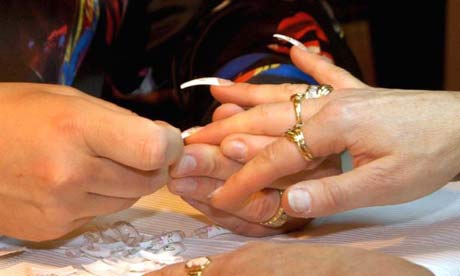
A scandal of second-rate care in parts of the beauty industry has been revealed today by health and safety officials, who have even highlighted cases of women suffering with paralysis of the face, burnt scalps and lost fingernails.
In the worst examples badly trained staff and cost-cutting managers are exposing clients to the risk of infection because waxings, anti-ageing treatments and body piercings are not carried out properly. The warning comes from the Chartered Institute of Environmental Health. Its members, environmental health officers working for local councils, have uncovered a range of dubious practices in nail bars, beauty salons, hairdressers and sunbed parlours.
'I'm sure there's a perception that anything that goes on in a shop on the high street is well regulated and entirely safe,' said David Newsum, a health and safety policy officer at the institute. 'But it may not be. People have been injured by a badly applied hair treatment, or by a cosmetic treatment, such as facial paralysis from Botox, or by being burnt in a sunbed salon.
'It could be that a treatment is in itself intrinsically dangerous or it is the way it is administered. While the vast majority of premises are giving customers safe treatments, we need to root out places that are causing real problems.'
While the number of people who complain after having a bad experience is small, environmental health officers believe the true figure may be much higher because many incidents go unreported. 'There's a growing concern about the need to look into this whole area,' Newsum added.
The institute's findings and concerns were echoed by the Local Authorities Co-ordinators of Regulatory Services, which represents officials who carry out enforcement duties for local councils.
Nail bars are a particular cause for concern, said Karen Ashdown, the organisation's health and safety licensing officer. Some are using acrylic nail products containing methyl methacrylate (MMA), a chemical that has been blamed for causing lung, kidney and liver problems, asthma, and allergic reactions. It is far cheaper than the much safer alternative, EMA. More than 30 states in America have banned MMA.
'The trouble is that it is a permanent bonding agent, so women can't easily remove their false nails,' said Ashdown. 'They can still prise them off, but it will often pull off their real nail too. Real harm does happen sometimes.'
Some women have ripped open the top of their finger after getting their false nail caught in clothing because it was glued on so tightly.
Increasingly popular waxing procedures run the risk of spreading infections such as herpes and the contagious skin complaint impetigo, she added: 'Bacteria can start to live in the wax if a spatula is used to apply it to two or more clients. A spatula should be single use, but sometimes it's not. Some people have ended up in hospital with an infection, including septicaemia, after having a tattoo or piercing. Some henna tattoos that use the wrong type of henna can burn the skin.'
Burgeoning demand for laser treatments to remove unwanted hair and blemishes and injections of anti-wrinkle substances such as Botox is also a problem, because clients could be burnt or infected, Ashdown added.
Although such premises are meant to register with the Healthcare Commission, not all do. The Health and Safety Executive has published two reports this year highlighting risks to nail-bar staff. One found the nail technicians' work with chemicals and potentially hazardous dust and vapours left them with 'a statistically significant increased prevalence of work-related symptoms, including nasal, neck, shoulder, wrist/hand and lower back problems, as well as headaches and upper back, leg and foot problems. Ventilation needed to reduce exposure may not be effective, the HSE found.
Its other report, based on inspections of 205 hairdressers, beauty salons and nail bars, found that staff there were 'at potential risk of developing skin and respiratory ill-health conditions if good working practices and effective exposure control methods are not applied'.
Many hairdressing staff also suffer from dermatitis because their hands are often wet and handling chemicals in dyes, bleaches and shampoos.
These concerns about the beauty industry come after a drugs watchdog last week warned the public not to use an injectable tanning aid called Melanotan. The tan jab is an unlicensed medicine that is being sold illegally in some tanning salons and body-building gyms, as well as over the internet. The powder, which is mixed with water, has not undergone safety checks and has been linked to increased blood pressure.
'We don't know what the side-effects are, so it could do harm to your short-term or long-term health. Users are taking a gamble with their lives,' said a Medicines and Healthcare Products Regulatory Agency spokeswoman.

